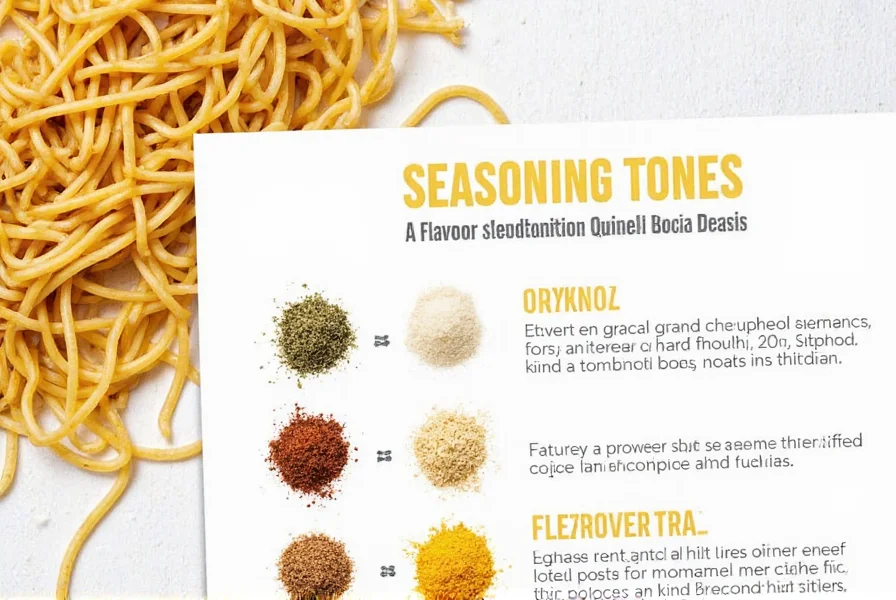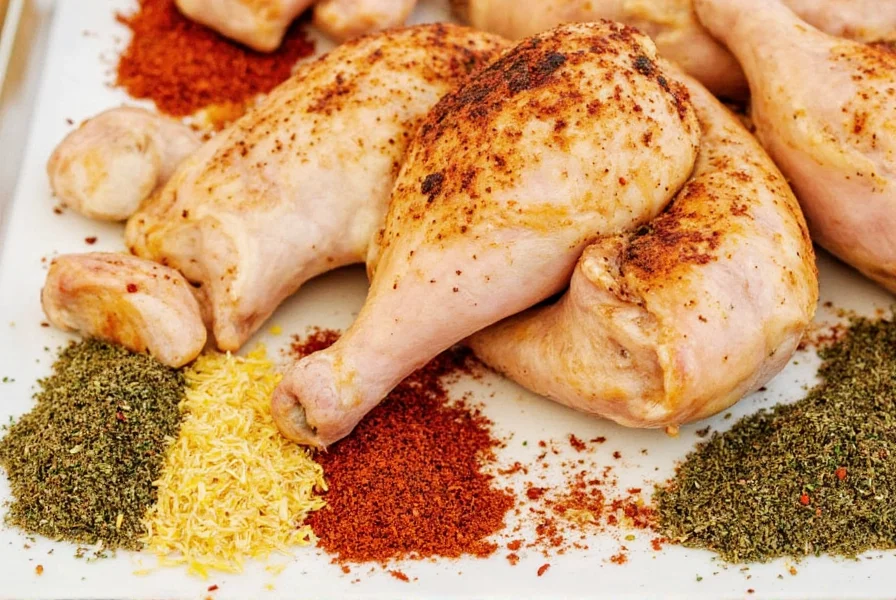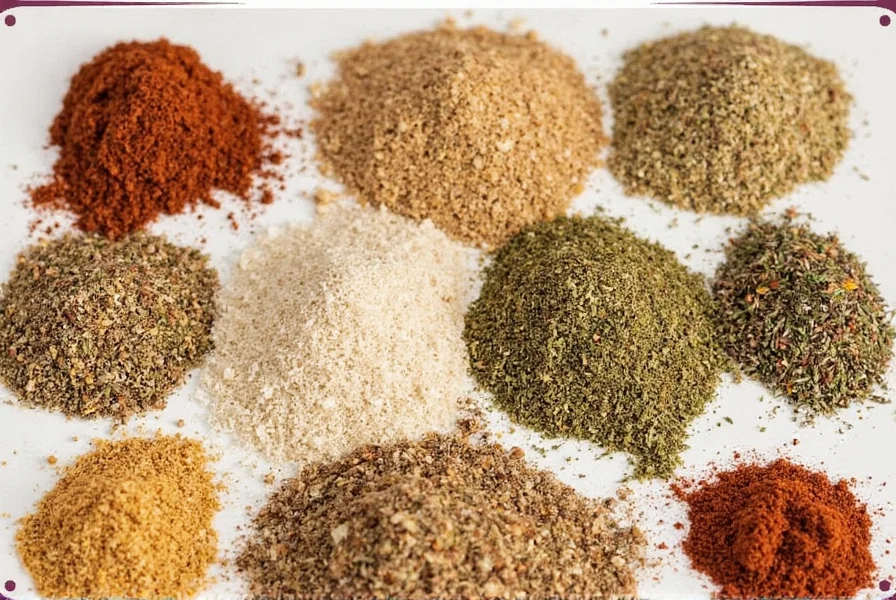Table of Contents
Introduction
As a professional chef with over 15 years of experience in culinary arts and food science, I've learned that the difference between mediocre and exceptional chicken dishes often comes down to proper seasoning. When you search for "seasonings for chicken," you're likely looking for expert guidance on transforming simple chicken into restaurant-quality meals. This comprehensive guide covers the 10 essential seasonings every cook should know, how to use them for different cooking methods (grilling, baking, frying, etc.), and how to create perfect flavor profiles for various cuisines. Whether you're a beginner or experienced cook, these scientifically-backed techniques will elevate your chicken dishes every time.

Top 10 Seasonings for Chicken
Based on culinary science and professional chef recommendations, these 10 seasonings form the foundation for perfectly seasoned chicken across all cooking methods and cuisines:
- Garlic Powder – Adds a deep, savory flavor without the need for fresh garlic. Essential for Mediterranean and Latin American dishes.
- Paprika – Gives a smoky, sweet, or spicy kick depending on the type. Smoked paprika is particularly valuable for grilled chicken.
- Oregano – A staple in Mediterranean cuisine, perfect for grilled or baked chicken. Fresh oregano provides significantly more flavor than dried.
- Thyme – Adds a subtle, earthy aroma that pairs well with almost any dish. Excellent for roasted chicken and braised dishes.
- Black Pepper – A must-have for any seasoning blend. Freshly ground pepper provides superior flavor compared to pre-ground.
- Salt – The foundation of all good seasoning. Kosher salt is preferred for even distribution and better texture.
- Onion Powder – Adds a mild, sweet onion flavor that complements chicken nicely. Works well in dry rubs and marinades.
- Chili Powder – Perfect for those who like a little heat. Contains multiple spices for complex flavor.
- Cumin – Brings a warm, nutty flavor that works great in Mexican, Middle Eastern, and Indian-inspired dishes.
- Italian Seasoning – A mix of herbs like basil, oregano, and rosemary for a classic Italian taste. Ideal for baked chicken dishes.

Comparison Table: Top 10 Chicken Seasonings
| Seasoning | Flavor Profile | Best For | Professional Tip |
|---|---|---|---|
| Garlic Powder | Savory, aromatic | Roasted, grilled, sautéed | Use sparingly to avoid overpowering the chicken. For maximum flavor, combine with lemon zest. |
| Paprika | Smoky, sweet, spicy | Grilled, roasted, stews | Try smoked paprika for extra depth. Avoid high heat to prevent bitterness. |
| Oregano | Earthy, slightly bitter | Grilled, baked, pasta | Use fresh oregano for maximum flavor. Add towards the end of cooking to preserve aroma. |
| Thyme | Subtle, herbal | Baked, braised, soups | Great with lemon or garlic. Whole sprigs work better for slow cooking than dried leaves. |
| Black Pepper | Sharp, pungent | Any type of chicken dish | Grind it fresh for best results. Whole peppercorns retain flavor 3x longer than pre-ground. |
| Salt | Salty, enhancing | All dishes | Use sea salt or kosher salt for better texture. Season chicken 30 minutes before cooking for optimal flavor penetration. |
| Onion Powder | Mild, sweet | Stuffed, baked, sauces | Combine with garlic powder for a balanced flavor. Use in dry rubs for even distribution. |
| Chili Powder | Spicy, smoky | Grilled, tacos, chili | Adjust the heat level based on your preference. Start with small amounts and increase gradually. |
| Cumin | Warm, nutty | Mexican, Middle Eastern dishes | Pair with coriander for a complete flavor. Toast whole cumin seeds before grinding for enhanced aroma. |
| Italian Seasoning | Herbal, aromatic | Pasta, pizza, roasts | Use as a dry rub or mix into sauces. Check ingredient list to ensure it contains high-quality herbs without fillers. |

How to Use Seasonings Effectively
Knowing which seasonings to use is only half the battle—using them correctly is just as important. As a professional chef, I've found these evidence-based techniques consistently deliver the best results:
- Marinate First: Let the chicken sit in the seasoning mixture for at least 30 minutes (or overnight) before cooking. This allows the flavors to penetrate the meat. For dry rubs, apply at least 30 minutes before cooking for optimal flavor absorption.
- Balance the Flavors: Don't be afraid to experiment with different combinations. A little bit of sweetness, acidity, or heat can go a long way. For example, pair cumin with lime juice to balance the richness.
- Use Fresh Herbs When Possible: Dried herbs are convenient, but fresh ones pack more flavor. Chop them finely and mix into the seasoning blend. As a general rule, use three times the amount of fresh herbs as you would dried.
- Don't Overdo It: Start with a small amount of seasoning and adjust as needed. You can always add more, but you can't take it away once it's in. A good rule of thumb is 1 teaspoon of dried herbs or spices per pound of chicken.
- Pair with Complementary Ingredients: For example, if you're using cumin, consider adding a squeeze of lime or a dollop of yogurt to balance the richness. For garlic powder, pair with lemon zest for brighter flavor.
- Adjust for Cooking Method: For grilling, use rubs that can withstand high heat. For baking, consider wet marinades that keep moisture in. For frying, use dry rubs that create a crispy crust.

Buying Guide for Seasonings
When shopping for seasonings, it's important to choose high-quality products that will enhance your chicken rather than mask it. As a professional chef, I recommend these key factors to consider:
Features to Look For
- Ingredients: Check the label for natural ingredients and minimal additives. Avoid products with anti-caking agents like silicon dioxide when possible.
- Origin: Some seasonings are made from premium spices sourced from specific regions, which can affect the flavor. For example, Spanish paprika has a distinct flavor profile compared to other varieties.
- Texture: Choose between powdered, crushed, or whole spices depending on your needs. Whole spices retain flavor longer but require grinding before use.
- Shelf Life: Store seasonings in airtight containers away from light and moisture to preserve their potency. Most spices lose significant flavor after 6-12 months.
Recommended Products
Here are a few highly recommended seasoning products that are perfect for chicken, based on professional chef recommendations and culinary science:
- McCormick Garlic & Herb Seasoning
- Features: A mix of garlic, oregano, thyme, and other herbs with no artificial additives.
- Advantages: Versatile and easy to use with consistent quality. The blend is specifically designed for chicken dishes.
- Use Cases: Ideal for roasting, grilling, or baking chicken. Perfect for weeknight dinners when you need quick flavor.
- Target Audience: Home cooks looking for a quick, all-in-one seasoning with professional-grade quality.
- Suitable Occasions: Weeknight dinners, family meals, or potlucks where consistent flavor is important.
- Penzeys Smoked Paprika
- Features: Made from Spanish peppers and lightly smoked using traditional methods.
- Advantages: Adds depth and complexity to any dish without overpowering. The smoking process enhances natural flavors.
- Use Cases: Great for grilled chicken, stews, and marinades. Perfect for creating authentic barbecue flavors.
- Target Audience: Serious cooks and food enthusiasts who understand the importance of quality spices.
- Suitable Occasions: BBQ nights, holiday feasts, or special occasions where flavor complexity matters.
- Simply Organic Cumin
- Features: Pure, organic cumin seeds sourced from India, where the best cumin is grown.
- Advantages: Natural and free from artificial additives. The organic certification ensures quality and purity.
- Use Cases: Perfect for Mexican, Indian, or Middle Eastern-inspired chicken recipes. Toast before use for maximum flavor.
- Target Audience: Health-conscious individuals and organic food lovers who prioritize ingredient quality.
- Suitable Occasions: Casual dinners, cultural celebrations, or everyday meals where authentic flavors are desired.

Frequently Asked Questions
What are the best basic seasonings for chicken according to professional chefs?
According to culinary experts, the absolute basics for seasoning chicken are salt, black pepper, garlic powder, and onion powder. These create a perfect foundation that enhances chicken's natural flavor without overpowering it. For many professional chefs, this simple combination is all you need for delicious results. The key is using high-quality ingredients and proper proportions - about 1 teaspoon of dried herbs or spices per pound of chicken, with salt at 3/4 to 1 teaspoon per pound.
How much seasoning should I use on chicken for different cooking methods?
The amount varies by cooking method:
- For grilling: Use slightly more seasoning (1.5 teaspoons per pound) as high heat can burn some flavors
- For baking: 1 teaspoon per pound is ideal as the oven distributes flavors evenly
- For frying: Dry rubs work best with 1.25 teaspoons per pound to create a crispy crust
- For slow cooking: Use less (0.75 teaspoons per pound) as flavors concentrate over time
Should I season chicken before or after cooking for different methods?
For best results, season chicken before cooking, but the timing depends on the method:
- Grilling: Season at least 30 minutes before cooking to allow flavors to penetrate
- Baking: Season 1-2 hours before for optimal flavor absorption
- Frying: Season immediately before coating for best crust formation
- Slow cooking: Season at the beginning to allow flavors to develop over time
What seasonings work best for specific chicken dishes?
Different dishes require specific seasoning approaches:
- Grilled Chicken: Smoked paprika, garlic powder, cumin, and a touch of chili powder create perfect barbecue flavors
- Baked Chicken: Italian seasoning, thyme, rosemary, and lemon zest work beautifully for oven-roasted chicken
- Fried Chicken: A blend of paprika, garlic powder, onion powder, and cayenne creates the classic crispy crust
- Chicken Tacos: Cumin, chili powder, oregano, and lime juice for authentic Mexican flavors
- Chicken Curry: Turmeric, cumin, coriander, and garam masala for Indian-inspired dishes
How long should I marinate chicken with seasonings for maximum flavor?
Marinating times vary by seasoning type and cooking method:
- Dry rubs: 30 minutes to 2 hours (longer doesn't significantly improve flavor)
- Wet marinades with acid (lemon, vinegar): 30 minutes to 2 hours (acid can "cook" the chicken if left too long)
- Wet marinades without acid: Up to 24 hours for maximum flavor penetration
- Brines (salt water solutions): 4-12 hours for juicier meat
What are the most common mistakes when seasoning chicken?
Based on professional chef feedback, these are the top mistakes to avoid:
- Over-salting: Always taste before adding more salt. Salt draws out moisture and can make chicken tough if overdone
- Using stale spices: Most spices lose significant flavor after 6-12 months. Replace them regularly for best results
- Not balancing flavors: A good seasoning blend should have sweet, salty, sour, bitter, and umami elements
- Adding all seasonings at once: Some spices (like garlic powder) benefit from being added at different stages of cooking
- Ignoring cooking method: What works for grilling doesn't necessarily work for baking or frying
Are there seasonings I should avoid with chicken?
While personal taste varies, professional chefs generally avoid these with chicken:
- Extremely strong spices like cloves or star anise in large quantities (they can overwhelm chicken's mild flavor)
- Pre-made seasoning blends with excessive salt or MSG (check ingredient labels carefully)
- Spices that burn easily at high heat (like some dried herbs) for grilling or frying without proper protection
- Artificial flavors or colors (opt for natural spices instead)
Conclusion
Seasonings are the unsung heroes of the kitchen, especially when it comes to chicken. With the right combination and proper technique, even the simplest chicken dish can become a standout meal. From classic herbs like oregano and thyme to bold spices like cumin and chili powder, there's something for everyone. As a professional chef, I've found that mastering the art of seasoning chicken is a valuable skill that can transform your cooking. The key is understanding how different spices interact with various cooking methods and cuisines. So next time you're prepping chicken, remember that proper seasoning isn't just about adding flavor - it's about creating a balanced, harmonious dish that showcases the chicken's natural qualities. Now that you've read through this expert guide, it's time to get creative in the kitchen and try out these seasonings. And remember, the best part of cooking is having fun while doing it.

Whether you're a professional chef or a home cook, mastering the art of seasoning chicken is a valuable skill that can transform your cooking. Now that you've read through this guide, it's time to get creative in the kitchen and try out these seasonings. And remember, the best part of cooking is having fun while doing it.











 浙公网安备
33010002000092号
浙公网安备
33010002000092号 浙B2-20120091-4
浙B2-20120091-4